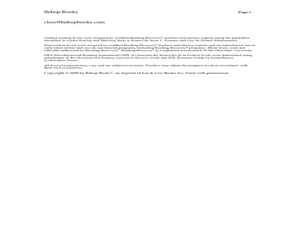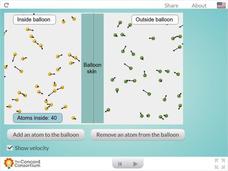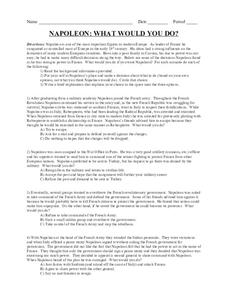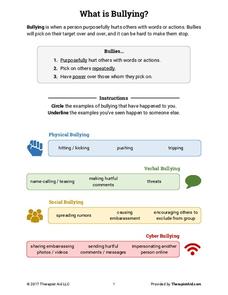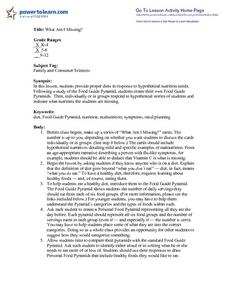Curated OER
What Makes Day and Night?
In this What Makes Day and Night worksheet, students explain what makes day and night by looking at pictures of the earth and sun and reading 11 related words. Students also write interview questions for a scientist and investigate day...
Curated OER
"If You Are What You Eat, Then What Am I?"
Geeta Kothari presents an honest and compelling account of trying to assimilate into American culture. After your class reads her short story "If You Are What You Eat, Then What Am I?," present your scholars with this two-page analysis...
Curated OER
What Do You See at the Pond?
With What Do You See at the Pond?, young readers explore pond life and practice reading strategies. Learners first make predictions and then read the simple story independently. After a second read-through with a partner, kids come...
MOST
What Are Cells?
What's in a cell, anyway? Kids read informational text on what makes up both animal and plant cells, including a page of vocabulary terms they will need to be familiar with (cytoplasm, ribosomes, vacuoles, etc.). Full-color images make...
American Museum of Natural History
What Do You Know About Genetics?
Just what do you know about genetics? The online resource contains 10 questions about genetics. Scholars work through the questions ranging from what DNA stands for to how much of human DNA is similar to that of a fruit fly. Scholars...
Concord Consortium
What Is Pressure?
Balloons bring great fun to the classroom, until they break. What's a teacher to do then? Break out the balloon of the computer age with a fun interactive! Science scholars add and remove atoms from their virtual balloons and observe...
Curated OER
What Do They Eat?
What does a monkey eat? How about a squirrel? Introduce your young scholars to different types of eaters in the animal kingdom with this cut-and-paste activity. Students assess 6 animals: a squirrel, a frog, a monkey, a seal, a dog, and...
Curated OER
What We Eat, Where We Sleep: Documenting Daily Life to Tell Stories
This is not just a New York Time article to read, this is a set of amazing activity ideas all related to the slide shows "Breaking Bread Everywhere" and "Where Children Sleep." Your class can view each show, read about what they mean...
Curated OER
What a Character! Comparing Literary Adaptations
What do Robert Downey Jr., Basil Rathbone, Jeremy Brett, Fritz Weaver, Roger Moore, Benedict Cumberbatch, and Daffy Duck have in common? Why, it’s elementary, my dear Watson! They all have portrayed Sherlock Holmes. Literary detectives...
John F. Kennedy Presidential Library & Museum
Ask Not What Your Country Can Do for You
Ask not what the lesson here can do for you, but what you can do with the lesson. The answer is quite a lot! Young scholars revisit JFK's famous inaugural address with a focus on his plea for civic engagement. There's a letter to JFK...
Beverly Hills High School
Napoleon: What Would You Do?
Begin a study of Napoleon Bonaparte and the French Revolution by presenting class members with 10 situations that Napoleon would face as he rose to power. Individuals select one of three options for each scenario that represents what...
K12 Reader
What Happens Next?
While your students may not be psychics, that doesn't mean they can't predict what will happen next in a story. To hone this important reading comprehension skill, young learners read a series of three short passages before writing a...
King Country
Lesson 10: Communication - Day 3: Asking for What You Want
High schoolers practice appropriate verbal and non-verbal methods of asking for what they want in a lesson designed for the special education classroom.
EngageNY
Relationships Between Key Scientific Concepts: Planning What Causes Earthquakes
That is ground shaking news! Scholars read Earthquake in multiple reads to determine the gist, identify cause and effect relationships, and understand vocabulary. Learners complete graphic organizers to describe what happens before and...
Curated OER
What to Expect on Valentines Day: A Social Story
Valentine's Day is fun and exciting for most members of your class, but for learners on the autism spectrum, it can be disorienting. A social story demonstrates what one can expect on Valentine's Day. It explains what happens on...
Therapist Aid
What is Bullying?
What is the definition of bullying, and how can you deal with it? Elementary and middle schoolers discuss verbal, physical, social, and cyberbullying before talking about strategies to avoid and stop bullying in their school.
Student Handouts
What We Did Today
Keep parents in the loop of what their children are learning in your classroom by sending students home with this quick printable. Learners note their in-class activities and work, homework assignments, and what to expect in the coming...
Health Smart Virginia
What Is It Like to Be You?
Two poems, "What it is like to be you" and "I am more than what you see," provided young scholars an opportunity to reflect on how others see them versus how they see themselves. After reading the poems, individuals write their stories...
Keep Your Children Safe
What Is Happiness
Explore the feeling of happiness with a worksheet created to boost emotional intelligence. Scholars detail what makes them happy then draw a happy face.
C3 Teachers
African American Voices and Reconstruction: What Does It Take To Secure Equality?
High schoolers research the 13th, 14th, and 15th Amendments, as well as other primary source documents, to determine Reconstruction's impact on the North and South. The 34-page inquiry-based lesson includes a staging question and...
Curated OER
What Am I Missing?
Discuss nutrition and identify components of a healthy diet, view a Food Guide Pyramid, and create a Personal Food Pyramid, listing all foods eaten in the past 24 hours. Compare food lists with the standard Food Guide and determine where...
Curated OER
What Makes The Good Life
What makes a good life? What makes life hard? Get your class thinking about the global picture with this extensive packet. They read quotes from around the world, analyze statistical data from every continent, then read and answer...
Curated OER
Assessing the Traits: What is Good Writing?
High schoolers examine samples of writing and discuss the score it received. They brainstorm what qualities make a good writer and stories.
Curated OER
What A Pair! A Cross Grade Writing Activity
What a pair! Older pupils interview younger ones and use what they learn to write a short, illustrated storybook that features the youngster as the main character. The youngster responds with a thank-you note in which they identify their...
Other popular searches
- What Is Inauguration
- What Plants Need
- What Is an Autobiography
- What Is Veterans Day
- What Is Democracy
- What Is Science
- What Is Gravity
- What Is Algebraic Expression
- What Is a Memoir
- What Is Culture
- What Is Anthropology
- What Is Contemporary Music




